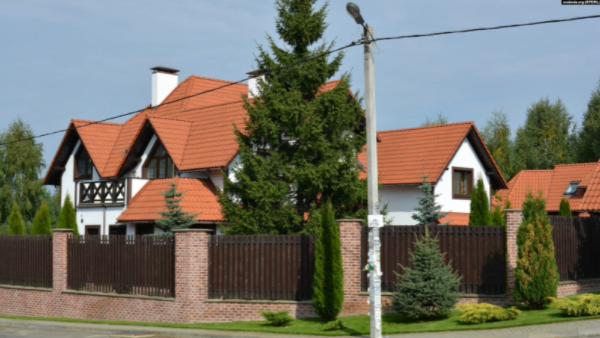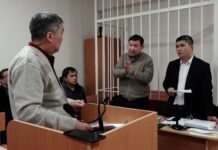Every month Kyrgyz media is filled with headlines about the detention of high-ranking officials, sometimes followed by news about the severe sentences handed down to them by the courts. However, Kloop found out that these officials frequently get off without punishment: they flee from justice abroad, buy their way out with donations to the budget, and are released on amnesty. But most concerning is that after some time, one out of every five officials returns to politics and the civil service.

In 2012, the ex-Minister of Transportation and member of the Jogorku Kenesh Nurlan Sulaimanov was accused of abuse of power. According to the Prosecutor General, Sulaimanov created favorable conditions for his relatives’ company to win the bid for the purchase of materials and machinery for road work, which caused the government damages of more than 41 million soms (approximately $870,000.) But no one was able to hold Sulaimanov accountable: he flew to Germany for treatment and “disappeared.”
In 2016, Nurlan Sulaimanov’s criminal case was dropped because the statute of limitations had run out. And in October 2020, he again ran in the Jogorku Kenesh elections as a candidate from the Kyrgyzstan party.
To find out how high-ranking officials are held accountable, Kloop gathered press releases from the State Committee for National Security (ГКНБ), Ministry of the Interior (МВД), and Kyrgyzstan’s Prosecutor General from 2015-2020 and learned that over six years criminal cases had been opened against at least 98 of these officials. More than half of them are free from custody, but only seven have actually been acquitted.
Every sixth official that was mentioned in the law enforcement agencies’ press releases left Kyrgyzstan after criminal charges were brought against them. Half of them are still missing and wanted.
So, on the night of October 5 to the 6, 2020, during mass protests and disorder in Bishkek, former President Almazbek Tambaev and other convicted officials and deputies were released from detention facilities. After Sadyr Japarov, who also left prison that night, came to power, the Prosecutor General called for everyone to return to the detention facilities.
But the former Prime Minister Sapar Isakov and the ex-Mayor of Bishkek Albek Ibraimov did not submit to the demands of law enforcement and left the country. The State Penitentiary Service reported that they had been put on the international wanted list. Soon an appeal to his compatriots appeared on Isakov’s official Facebook page with a location tag for Moscow, in the Kremlin.
Some fugitives did well for themselves abroad despite the serious charges that had been brought against them at home. For example, Kyrgyzstan’s former presidents Askar Akayev and Kurmanbek Bakiyev and their close relatives, who fled to Russia, Belarus, and Great Britain.
Fugitive Officials Live in Luxury Abroad
The first president Askar Akayev ruled Kyrgyzstan for almost 15 years. While in office, he altered the Constitution five times, increasing his own powers. In 2000, Akayev was elected president for the third time, even though the Constitution stipulated that someone could only be elected for two terms.
During Akayev’s rule, his family actively interfered in the country’s politics. His wife Mairam headed the Women’s Party of Kyrgyzstan and the charity Meerim, which faced criminal charges for the illegal transfer of funds in 2005.
Under Akayev, the government’s share in the Kyrgyz-Canadian joint venture to mine Kumtor, the country’s largest gold deposit, decreased from 67% to 16%. In 2021, a commission monitoring the activities of Kumtor found out that Akayev’s family received a large bribe of money and stocks for his involvement. Akayev denied these accusations, mentioning that after he was overthrown in 2005, a government commission was created to search for his “riches,” but nothing was found.
What do people still blame Akayev for?
In 2002, Akayev relinquished a piece of Kyrgyz territory in the Uzonguu-Kuush Gorge to China. Azimbek Beknazarov, a member of parliament, proposed impeaching the president and he was detained.
Beknazarov’s fellow countrymen held a protest and demanded that he be released. The police opened fire on the protestors—six people were killed and more than thirty were injured. This massacre of peaceful citizens is known in Kyrgyzstan as the “Aksy Events.”
In 2005 Kyrgyzstan’s ex-Prime Minister Kurmanbek Bakiyev headed the Tulip Revolution, overthrew Akayev, and took his place. The pretext for the coup was the parliamentary elections.
After the elections, the majority of the seats in the Jogorku Kenesh were won by Alga Kyrgyzstan, the Akayev family’s political party, and Akayev’s daughter and son became deputies in parliament. The opposition did not agree with the election results, so people took to the streets and seized the White House. The Akayev clan was forced to flee to Kazakhstan first, and then to Russia.
In Kyrgyzstan, dozens of criminal charges were brought against the Akayev family. The total damage caused to the government is valued to be tens of millions of US dollars. Those close to the fugitive ex-president have been put on the international wanted list.
Askar Akayev lives in Moscow, working as a professor at Moscow State University. In 2020, his son Aidar was found dead in a luxurious mansion worth more than $1 million in the prestigious residential suburb of Rublyovka.

Akayev’s replacement Kurmanbek Bakiyev also fled the country in 2010. He repeated all of the mistake of his predessesor: he changed the Constitution four times in the course of five years and put his family in power.
Bakiyev’s older son Marat headed the State Committee for National Security and eavesdropped on members of the opposition. The younger son Maksim was the director of the Governmental Agency of Development and Innovation, which allowed him to seize dozens of state-owned enterprises.
During Bakiyev’s rule, 30 contract killings of oppositionists and public figures were committed in the country. It was proven that the Bakiyevs had organized the kidnapping and brutal murder of three people.
In 2009, Bakiyev won the presidency again. The opposition did not agree with the results. In April 2010, people started to protest. Bakiyev gave the command to shoot. More than 80 people died, and more than 300 were wounded. The president and his family fled the country.
Kurmanbek Bakiyev, who was sentenced to prison for 30 years for corruption, contract killings, and the mass shooting of peaceful civilians, now lives in Lebyazhy, an elite residential district of Minsk. His son Maksim, who received a life sentence for corruption and criminal money laundering, now lives as a fugitive in the United Kingdom where he has an estate worth more than $5 million.

Bakiyev’s other son Marat, who was sentenced to 30 years in prison for corruption and soliciting murder, lives in the elite village of Raubichi near Minsk.

In 2010, the Bakiyevs were placed on the international most wanted list by Interpol.
Share or Face the Consequences
Zamirbek Kojokanov was sentenced to prison for five years for stealing money to purchase medicine for his sick child. Rayymbek Matraimov was given a 260 thousand som fine for organizing a customs corruption scheme that allowed him to funnel no less than $700 million out of the country.
Those are the sentences that Kyrgyz courts give a high-ranking official and an everyday citizen. The only similarity between Matraimov and Kojokanov is that they stole something. Matraimov is the former deputy head of the Kyrgyz customs and he possesses countless riches, but Kojokanov is a simple construction worker with three young children and an elderly mother.
Rayymbek Matraimov was fired from the position of Deputy Chairman of Kyrgyzstan’s Customs Service in 2017 “due to a loss of trust” after journalists from Azattyk discovered that Matraimov owned two supermarkets and a sports center and that his family had apartments and mansions in Bishkek and Osh.
Later, people close to the customs officer were found to have property abroad in Dubai and London. Matraimov’s son and wife posted pictures from elite resorts on social media where they flaunted famous brands. Journalist calculated that the clothing and jewelry that Matraimov’s wife showed off on Instagram could cost $400 thousand, and that his son’s watch was $43 thousand.
Those prices did not reflect the government official’s salary: according to this declaration, he earned a total of 587 thousand soms a year (approximately $8,500.)
After information was published about the fabulous wealth of the ex-customs worker, a series of rallies took place throughout the country with demands to judge and punish corrupt officials fairly.
Where Does Matraimov Get His Money From?
Rayymbek Matraimov worked in customs for twenty years and build an empire of corruption, allowing those who cooperated with him to forgo paying taxes and customs duties. The joint investigation by OCCRP, Azattyk, and Kloop revelaed that together with the influencial Uighur clan Abdukadyr, Matraimov’s people took over the transit trucking industry and customs terminals where, for a bribe, expensive goods like machinery and electronics, were registered as inexpensive textiles.
The money earned was funneled out in the form of cash from Bishkek to Istanbul, and then through a bank to the UAE, the United Kingdom, or the USA.
In October 2020, Mekenim Kyrgyzstan, a political party tied to the Matraimov family, took second place in the parliamentary elections, which were full of violations. Kyrgyz people who were dissatisfied with the results gathered at rallies, which ended with the seizure of the White House and the release of prisoners from pre-trial detention centers and prisons.
One of the people released was Kyrgyzstan’s current president, and the, at the time, disgraced politician Sadyr Japarov. Japarov went directly from his cell to the rally, where he promised the crowd, “‘Rayym Million’ will go to jail!”
Indeed, Matraimov was soon detained. But he was released on the same day: he agreed to cooperate with the investigation and to compensate for 2 billion soms ($24 million) worth of damage.
“If we arrest him and decide to confiscate his property, then we’ll take a house, some cars, or some other object. But that won’t be 24 million dollars’ worth, it won’t even be two million dollars’ worth of property,” Japarov explained.
Matraimov paid two thirds of the amount in cash, and the rest in real estate: the ex-government official surrendered a mall building and ten apartments totaling 600 million soms ($7 million) to the government. Interestingly, the apartments had been purchased by Matraimov only a week before giving them up, as journalists suspect, at inflated prices.
Applicants for the apartments were quickly found: the head of national security Kamchybek Tashiev declared that eight of the apartments would go to his employees. He quickly backed out due to public pressure, but who got these apartments remains unknown.
Matraimov was charged with two counts. The court found him guilty of corruption and charged him with a 260 thousand som fine. But the second count concerning money laundering was dropped four months later. The State Committee for National Security reported that they did not find Matraimov to have any real estate abroad. Matraimov had paid his money, so he could be released.
However, Matrimov is not the only politician who managed to escape prison by sharing with the government.
In 2020, on the eve of the parliamentary elections, the ex-Head of the Financial Police Bakir Tairov called the Director of the State Agency for Land Resources Kanybek Botobayev to his office. And under the threat of being fired, he demanded that the agency’s staff donate money to the pre-election campaign of one of the pro-government parties, and then vote for them. Botobayev collected $14 thousand from his employees and subordinate organizations and transferred it to Tairov.
The court found Tairov guilty of corruption and gave him a fine of 265 thousand soms ($3,125.) Additionally, Tairov made a voluntary contribution of $14 thousand to the state.
We counted fifteen more cases when the courts gave officials fines—that’s 38% of all sentences handed down. The courts started handing down similar sentences particularly often after Kyrgyzstan’s government announced an economic amnesty called “kusturization”: in addition to being fined, criminals make voluntary donations to the accounts of law enforcement agencies.
“Kusturization” is a voluntary donation to the state made by officials who are suspected and accused of corruption. According to the government, “kusturization” should compensate for the damages caused to the budget, which are calculated by the State Committee for National Security. Despite its widespread usage, the procedure of “kusturization” is not specified in Kyrgyzstan’s laws.
“There is so much stolen money. We don’t intend to imprison every official who has stolen money from the state treasury. If they return the money to the government legally then under the article “cooperation with an investigation,” we can let them go,” explains the Head of the State Committee for National Security Kamchybek Tashiev.
However, the actual mechanisms of “kusturization” remain unclear: by whom and how the damages are determined and where the money goes after criminal charges are dropped—are they transferred to the budget or deposited into the accounts of law enforcement officers—is unknown. This information is not disclosed publicly.
Experts consider the practice of “kusturization” to be flawed. Essentially, under the pretext of easing their sentence, people are forced to admit their guilt and pay damages before the court’s decision, according to the head of the “Adilet” Legal Clinic Cholpon Djakupova.
“Many would consider similar actions to be common extortion and blackmail carried out by officials who are taking advantage of their positions,” Djakupova emphasizes.

Nine out of ten of all cases brought against high-ranking officials relate to unjust enrichment. 41% of these cases are based on the charge of corruption.
However, often even in cases where it would seem that the evidence is there, they are unable to get a conviction.
In December 2018, the Vice Prime Minister Duishenbek Zilaliev was detained in the Manas International Airport when he tried to leave Kyrgyzstan. $889,000 that had not been declared, as well as valuables, were found in his bank safe deposit box.
Additionally, the State Committee for National Security discovered that Zilaliev had undeclared real estate—land plots, apartments, and office spaces. Zilaliev could not have earned enough money for that with honest labor: according to official data, his and his spouse’s earnings from 2011 to 2017 totaled 3 million soms.
A criminal case of unjust enrichment was brought against Zilaliev. Additionally, he was accused of corruption: while occupying the position of the Director of the State Agency for Geology and Mineral Resources, he registered several licenses for mining gold and other deposits to an unemployed relative.
The courts initially found Zilaliev guilty of the alleged charges. However, in June 2021, the Supreme Court overturned his sentence and sent his case for a second look “due to procedural violations.”
According to the General Prosecutor’s Office, in the last six years, the number of corruption as well as other crimes against the interests of the state has grown almost three times. And in 2020, on average five corruption offenses were committed per day.
A Humane Court and the Savoir of Amnesty
In 2015, the Head of the Investigation Department of the Prosecutor General's Office Kylychbek Arpachiev was detained in his office in the exact moment he was receiving a bribe of $100,000. Initially, he was convicted of corruption and given a punishment of 14 years in a high-security prison.
But in 2019, the court lightened the charges to “abuse of a position of power” and “extortion of bribes.” Arpachiev’s sentence was reduced, and he was sent to a low-security prison.
In addition to corruption and abuse of power, officials in Kyrgyzstan are accused of fraud, seizing buildings, smuggling, and even robbery.
In 2017, the State Committee for National Security detained ex-deputy Raikhan Tologonov on charges of looting. According to the investigation, in April 2010, during the second Kyrgyz revolution, a group of individuals under the command of Tologonov robbed offices and residential buildings, including those that belonged to the fugitive ex-president Bakiyev. Tologonov himself declared that he considers the looting charge to be politically motivated.
Tologonov was sentenced to 15 years, but as a result of several pardons, his sentence was reduced to five years and three months.
Kyrgyzstan’s current president Sadyr Japarov has spoken about the lack of transparency in the use of amnesty in Kyrgyzstan and about how bribes can get people out of prison.
“In Kyrgyzstan orders and titles aren’t the only things that can be bought. When I was imprisoned, I saw how some guys paid money to be given amnesty. Of course, the money isn’t taken by the president, but responsible officials,” Japarov declared when he came to power last fall.
He added that “there aren’t any children of officials or rich people among prisoners, only people from ordinary families.”
The Cycle: Criminal Charges, Prison, Civil Service
After being detained, some officials disappear from the public eye for a bit, but they reappear in the political arena after a couple of years. Kloop calculated that every fifth official who faced criminal charges in the last five years returned to politics and the civil service.
In 2017, the Prosecutor General’s Office brought a case against the Jogorku Kenesh member Akylbek Japarov, who shares his surname with the current president. According to the investigation, in 2009, while he was Kyrgyzstan’s Minister of Economy and Finance, Japarov agreed to the disbursement of a budgetary loan of 200 million soms (approximately $4.8 million) to a business that was owned by the relatives of high-ranking officials, including his own wife.
However, Japarov did not suffer any punishments. He continued to serve in parliament, and in June 2021 again occupied the seat of the Minister of Economy and Finance of Kyrgyzstan.
What happened with his case is unknown. The State Committee for National Security and the Prosecutor General’s Office has not responded to Kloop’s questions about officials’ criminal charges. Regarding questions about the details of the investigation, Akylbek Japarov himself declared, “I don’t know what I was accused of on this issue.”
In October 2021, the president appointed Akylbek Japarov as the Head of the Cabinet of Ministers, who, according to the new Constitution, which was approved in April 2021, not only the government, but also the president’s administration will report to.
The current president Sadyr Japarov also made a memorable return to politics. In 2012, he and his friend Kamchybek Tashiev organized a rally in Bishkek, encouraged people to seize power, and climbed over the White House gates.
Security drove the protesters away, but Japarov and Tashiev became persons of interest in the case of an attempted forceful seizure of power. However, the court acquitted them. In 2013, during the campaign to nationalize the Kumtor mine, a crowd took the governor of the Issyk-Kul Oblast Emilbek Kaptagaev captive. The State Committee for National Security considered Sadyr Japarov to be the ringleader of the kidnapping.
After charges were brought against him, Japarov left the country, and lived in Poland, Turkey, and Cyprus. He returned to Kyrgyzstan in 2017 with the intention to take part in the presidential elections. But upon his arrival he was detained and sentenced to 10 years for disorderly conduct, use of force, hostage-taking, and death threats.
In October 2020, during a political crisis caused by the results of the parliamentary elections, Japarov went free and, after the resignation of the existing government, proclaimed himself the Prime Minister and acting president.
The Supreme Court promptly dropped all charges against Japarov and his friend Kamchybek Tashiev who the newly minted president appointed as the Head of the National Security Service of Kyrgyzstan.
Who Else Could Return to Power?
At least four officials and deputies who were former persons of interest in criminal cases in the last five years will participate in the Jogorku Kenesh deputy elections in November 2021 according to the list of different political parties:
- The Chairman of the Ata-Meken party Omurbek Tekebaev was accused of corruption and fraud, but he was acquitted
- Kubanychbek Kadyrov from the Ata-Jurt party served his sentence for attempted forceful seizure of power
- Accusations of corruption for Akhmatbek Keldibekov from the Azattyk party are still being reviewed by the court
- Emil Jamgyrchiev a candidate from the Alyans party who is suspected of receiving bribes is currently under investigation
Government Representatives Are Acquitted More Often than Others
The civil service has become a way to get rich instead of a place to serve for the good of the state, according to lawyer Klara Sooronkulova. Rich, high-ranking officials are able to evade punishment since the law operates selectively.
“I’m sure there are big corruption schemes here,” Sooronkulova explains. “There’s honor among thieves, they [representatives from all the branches of government] are interconnected to one another. Even if public opinion is focused on a case, it will fade away in three days, and then they [law enforcement agencies and the courts] will do whatever they want.”
Kloop’s journalists analyzed 26,000 criminal cases reviewed by different courts in the course of six years. They discovered that courts issue acquittals only in 4% of criminal proceedings. And government representatives are the ones most likely to be acquitted.
To avoid this, Soorunkulova believes that the legal process should be transparent. “Here systemic monitoring is needed,” she says. “We [citizens] should track [the entire process] from the filing of criminal proceedings to the issuing of the sentence and the serving of it. If the trial is interesting to me, I have a right to visit, be there, and observe the proceedings.”
But there are problems with transparency in Kyrgyzstan. While compiling research for this article, Kloop sent a series of questions about the progress of criminal cases and court decisions relating to specific officials to the Supreme Court, the Ministry of the Interior, the Prosecutor General’s Office, and the State Committee for National Security.
Every recipient either ignored the requests or declined to answer, referencing the law about the defense of personal information and their inability to disclose information “in the interests of an ongoing investigation.”
At the same time, Sadyr Japarov declared that in one year, beginning in October 2020, 46 heads of local governments had been brought to justice.
“Everyone who worked high-up and would say ‘I’m tough’ was detained,” reported the president, adding that “the fight against corruption has restored 7.5 billion soms to the budget.”
However, Japarov did not explain where this amount came from and how exactly it got into the budget.
Editors: Ekaterina Reznikova, Aizada Toma, Anna Kapushenko
Translated by Taylor Wilson from Respond Crisis Translation





